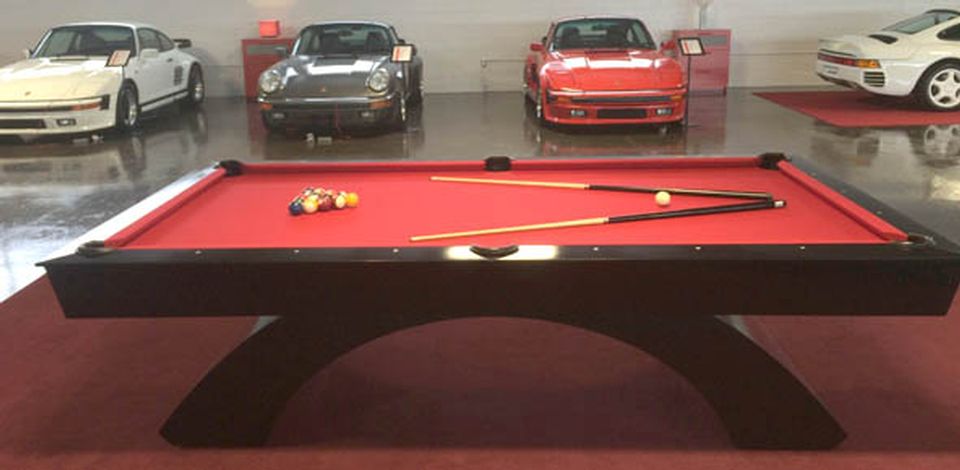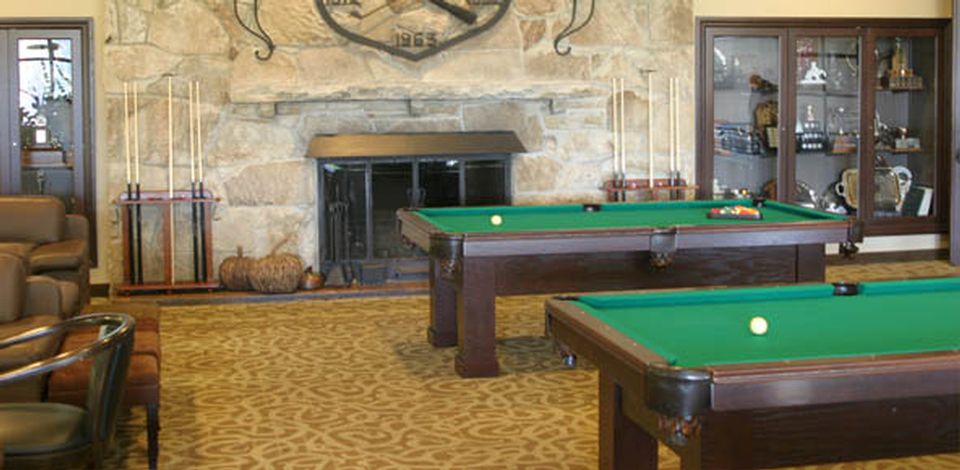Manufacturing
Palason the pool table manufacturer and retailer.
Palason Billiards Inc. is owned and operated by the Gervais family who has been designing, building and repairing billiard tables of all sorts for over 30 years.
The history
Laurent Gervais learned his trade by working at a large billiard factory that produced thousands of tables a year for the mass market. He then refined his skills by opening his own small billiard business where he built his tables one at a time and where he was called upon to service all sorts of tables and eventually called to start custom building and designing some for customers to their requirements.
The following is one created and custom built as per a local Montreal customer's request.

The service part of the business proved to be a critical learning experience, he and his team were called to move, re-felt, repair, and refinish tables made by a hundred different makers (so he got to see what worked and what didn't).
In Canada, back in 1975 in the year of Palason Billiards launch, the game that was most often played was snooker, on great big 6' X 12' tables. These were massive tables built like bridges, most of them made in England. Working on these antique tables he got to see the effect that time and humidity had on this fine furniture. He took careful mental notes to incorporate all the positive aspects and to find solutions for the problem areas for his own tables, to allow them to age in grace, beauty and with reliability. The following is a perfect example of a classic style, but with a modern design twist of rollers on the leg bases, that can be jacked-up to ease the table moving into different parts of the room or other neighboring hall.

The guarantee
The Gervais family lives in the same community where its products and services are sold. The family has both French and Irish blood lines and is determined to uphold and expand its good name. We feel that a pool table should last a lifetime, a purchase made only once, so to insure this policy a Palason table comes with a lifetime guarantee. We are also importers, distributors and retailers of many other brand names including Legacy, Heritage, Brunswick, Longoni and others.
Laurent Gervais said that before offering this type of solid guarantee he wanted to be sure that his grandchildren would not spend all their time repairing all the tables he sold before they were born.
To succeed he decided to use a careful blend of traditional wood working methods and modern engineering knowledge and to use both natural solid wood and man made products in the designing of his tables.
Common problems and the solutions
Shims vs. leg levelers
One problem he saw was in the use of shims to level the legs of a table, still today most table installers use a wide variety of pieces of cardboard or veneer to put under the leg in order to level it. He made the decision that all Palason tables would come with leg levelers incorporated into each leg, this would allow for extreme accuracy and for easy adjustment if there was any movement in the floor of the house.
Framed slate vs. attachment cleats
He decided to integrate the slate binding method of using attachment cleats which he so appreciated on the antique snooker tables. This method frames the complete three piece set of slate into one solid rigid component, independent of the table frame. The industry standard is to frame the slates individually and then screw them into the frame; this unfortunately leaves a weak point at the joints where the slate pieces meet.
Non welded vs. welded slates
Mr. Gervais discovered an interesting procedure once while repairing some antique table slates which he integrated into the assembly procedure for all Palason tables and that is chemically spot welding of the slate joints to further the effect of making the three pieces of slate into one solid and rigid component.
Standard vs. angled pocket cleats
One very simple but elegant feature that was integrated into the Palason line is the reversed angled pocket cleat which allows for the finest fitting cloth in the industry with the minimum of resistance when a player is retrieving balls from a pocket.
One-piece vs. knock down construction
In the sixties and seventies the lifestyle of the Canadian population was changing, they no longer bought a house for life. People where being transferred from one province to another or moving to nicer communities so the design of a pool table would have to take this into consideration. Many American manufacturers build tables that have a solid large body that although very strong is very difficult to get into most Canadian basements and if someone was to move , there would be no guarantee that it would fit into the new house .
So a Palason table would have to be completely knock down, something that could be assembled and disassembled many times without losing any of its strength or integrity in order to accommodate this nomadic reality.
Hardwood vs. engineered wood products
Understanding that the Canadian environment is one of extremes, he designed his products to withstand the variations in temperature and humidity. Knowing full well that 99% of pool tables in Canada would be installed in basements where the humidity levels vary greatly with the change of seasons, the following decisions were made;
- To use poplar plywood for all slate attachment cleats and for all frame structures. This insures stability.
- All natural solid wood components would be made by laminating pieces together while alternating the wood grain. This minimizes movement.
- To seal all surfaces of the components, even the parts that are not visible, with catalyzed sealer. This reduces the absorption rate of humidity.
As you can see, the Palason pool table is perfectly adapted to the Canadian climate and way of life.
The style and value
We at Palason feel that that a pool table is usually the most imposing and significant piece of furniture in a play room. The importance of being able to personalize the table to match your decor is paramount in having a well balanced room. That is why most Palason tables have many options like; leg style, stain option, cloth style and colour, pocket style and colour and table size from a 7' pool table to a 12' snooker table.
We also feel strongly about being able to complement your playroom with matching accessories; like dart cabinets, cue racks, scoreboards, bars, mirrors and shelves. These small details add tremendous value to the overall look of the room.
We believe in value. When you combine the quality of the raw materials , the care in the design , the workmanship of our craftsman , the lifetime guarantee that is backed by a family business that has been designing , building and servicing tables for over 30 years, and all of this at a competitive price, you get excellent value for your investment .
Mike Gervais
Chief Executive Officer
How much does a pool table weigh?
7 x 3½ Foot : A smaller format pool table for smaller room size homes.
Weigh from 600 lbs to 750 lbs
8 x 4 Foot : A standard in billiards and most popular format for a residential home pool table.
Weigh between 800 lbs to 1000 lbs
9 x 4½ Foot : Professional tournament-size pool table.
Weigh between 1000 lbs to 1300 lbs
10 x 5 Foot : Snooker Table
Weigh approx. 1500 lbs
12 x 6 Foot : Snooker Tournament Size
Weigh approx. 2500 lbs
Generally, bigger pool tables weigh more, with the largest professional models being the heaviest. The type of pool table also affects its weight. To estimate your table’s weight accurately, you need to consider both its size and type.
Slate is the traditional choice for pool table surfaces because it provides a smooth ball roll. It's cut from stone into large slabs that are strong enough to cover the whole table. One-piece slate tops are the heaviest, weighing 800 to 1,200 lbs or more for larger tables. Three-piece slate tops, made from smaller sections, are a bit lighter but still weigh between 700 and 1,000 lbs for good-quality home tables.
Wooden pool tables typically weigh between 450 and 700 lbs, depending on the type of wood. While solid wood adds great beauty, it also makes the table quite heavy.
The Slate
On slate pool tables, one-inch thick slate is the heaviest, offering the most stable and level surface but adding significant weight—around 500 to 700 lbs for a full-sized table. Three-quarter-inch slate is a good compromise, reducing weight while still providing a smooth playing surface if properly levelled. Half-inch slate is lighter and cheaper but may cause more vibrations, affecting ball play.
The Structure and Woods
The weight of solid wood tabletops depends on the type of wood. Exotic hardwoods like Mahogany and Walnut are heavier and denser, adding to the table's look but also its weight.
Softwoods like pine are lighter but may not hold up well over time. Many high-quality tables use maple, Oak, Poplar or Ash to balance weight and durability. Plywood and other engineered layered woods with alternating grains, often covered with natural wood veneer laminate, can also offer a very strong structure for a pool table and cost typically less to produce, which may provide a better value for consumers with a more modest budget.
Some budget pool tables use pressed composite materials instead of wood for their playing surfaces, often paired with plastic laminate coatings. These materials make the tables lighter compared to natural wood or slate. However, they can affect the physics and speed of the ball roll. While composites are ideal for casual play, they typically aren't the best option for serious gaming.
Moving a pool table / professional pool table movers
Opting for pool table professionals, such as those at Palason, guarantees safe transportation and setup. It's wise to hire experts for moving and installation rather than attempting to handle the heavy table on your own. Professional pool table movers have the specialized techniques and equipment that most homeowners lack.

